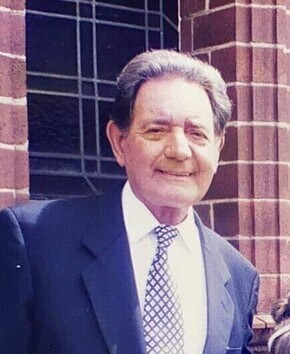D'ALBORA, Frank
| Service Number: | NX191785 |
|---|---|
| Enlisted: | 25 February 1944 |
| Last Rank: | Private |
| Last Unit: | Not yet discovered |
| Born: | GLEBE, NSW, 20 February 1923 |
| Home Town: | Not yet discovered |
| Schooling: | Not yet discovered |
| Occupation: | Not yet discovered |
| Memorials: |
World War 2 Service
| 25 Feb 1944: | Enlisted Australian Military Forces (WW2) , Private, NX191785 | |
|---|---|---|
| 13 Aug 1946: | Discharged Australian Military Forces (WW2) , Private, NX191785 |
FRANK D’ALBORA (1923-2004)
FRANK D’ALBORA
(1923-2004)
Frank D’Albora was born in 1923. His father, Francesco D’Albora, immigrated to Australia in 1909, aged 14, from the Eolian Island of Lipari, Italy. At the age of 22, he married Frank’s mother, Giovannina Allotta, in 1917.
His father died in November 1939. Frank’s brother, Laurie, was medically unfit for national service, so he managed the business for the family.
In 1942, Frank was called up by the citizen military forces in September 1942 and was immediately sent to a camp near Sydney for anti-aircraft training, as the Japanese were already invading Australia by bombing Darwin, so anti-aircraft was very essential to their defence at that time.
He was then transferred to the Australian Imperial Forces (2nd A.I.F.) with many of his mates. They were training for air warfare at various locations around Sydney and Brisbane; his service title was “GUNNER”.
After approximately three months of intensive training, Frank departed from Townsville, Queensland, on the troopship “M.V. Katoomba” bound for Port Moresby, New Guinea, early in 1943.
The Japanese army, by now, was advancing down the coast of New Guinea. Upon entering Port Moresby, the “M.V. McDui” was sinking fast after being bombed. This was a grim introduction on arrival.
They were quickly situated on “Lightning Ridge” overlooking Ward's airstrip and Jackson’s airstrip. As the weeks passed, life became uncomfortable and unbearable; mosquitoes and malaria were rampant, which left him partially deaf.
On the 20th February 1944, he celebrated his 21st birthday in New Guinea, and he and his mates drank jungle juice.
Upon his return to Sydney, he was sent to a camp at Dapto for re-grouping. The married men were discharged while the single men were being reformed to be sent to Tarakan, Borneo, but the enemy was defeated, and therefore they were not required to go.
He was discharged on the 13th August 1946 as a Corporal and group 2 instrument operator. Medals awarded were the 1939-1945 Pacific star, and the returned from active service star. Frank’s unit in New Guinea was the 82nd Australian Mobile anti-aircraft battery.
Frank served his country with great pride.
In his later life, he was sometimes called on to give talks on his wartime experience to school children and various gatherings.
He retained to the end his active interest in the Burwood RSL Sub Branch and was a member of the KOKODA Track Association and enjoyed the respect and affection of his colleagues.
Submitted 7 September 2025 by Natalie Ciccio









